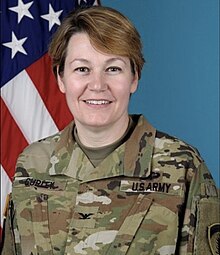Gail Curley
Gail Curley | |
|---|---|
 Official portrait, 2021 | |
| 11th Marshal of the United States Supreme Court | |
| Assumed office June 21, 2021 | |
| Preceded by | Pamela Talkin |
| Personal details | |
| Born | February 23, 1969 California, U.S. |
| Education | United States Military Academy (BS) University of Illinois, Urbana-Champaign (JD) Judge Advocate General's Legal Center and School (LLM) National Defense University (MS) |
| Military service | |
| Branch/service | United States Army |
| Years of service | 1991–2021 |
| Rank | Colonel |
Gail Anne Curley[1] (born February 23, 1969)[2] is the 11th Marshal of the United States Supreme Court, serving since June 21, 2021.[3][4] Before beginning her term as Marshal, she served as a staff judge advocate (attorney) in the United States Army.[5]
Education
[edit]Born in California,[2] Curley attended the United States Military Academy and earned a bachelor's degree in political science in 1991. She later attended the University of Illinois College of Law, graduating with a J.D. degree in 1999. Curley subsequently earned an LLM degree from The Judge Advocate General's Legal Center and School in 2004 and an MS degree from the Dwight D. Eisenhower School for National Security and Resource Strategy of National Defense University in 2014.[4]
Army career
[edit]After graduating from West Point, Curley joined the Signal Corps.[6] The Associated Press reported that in 2017 she said, "As a young Army signal officer I was able to lead a large platoon in Europe during my first assignment ... that was at a time when women were not allowed to serve as platoon leaders in certain jobs."
She later became the chief legal adviser to the U.S. Army Europe commander, where she oversaw 300 legal officials in Europe.[6]
Marshal of the United States Supreme Court
[edit]Curley began serving as the Marshal of the United States Supreme Court on June 21, 2021. She is the second woman to hold the position, succeeding the first woman to do so, Pamela Talkin.[3] As Marshal, Curley opens each Supreme Court session with an Oyez! Oyez! Oyez! call. When announcing her appointment, the Court described her responsibilities as being the Court's "chief security officer, facilities administrator, and contracting executive, managing approximately 260 employees, including the Supreme Court Police Force."[3][4]
Following the leak of a draft opinion in Dobbs v. Jackson Women's Health Organization in May 2022, Chief Justice John Roberts directed Curley to conduct an investigation "into the source of the leak."[7]
In July 2022, Curley sent letters to Maryland Governor Larry Hogan and Virginia Governor Glenn Youngkin asking them to enforce laws that prohibit protests and pickets outside of the private homes of justices.[8] On January 19, 2023, Curley released an official report on the leak of Dobbs.[9]
References
[edit]- ^ "Gail Anne Curley". West Point Association of Graduates. Retrieved May 25, 2022.
- ^ a b Register of Graduates and Former Cadets, United States Military Academy. West Point, New York: Association of Graduates U.S.M.A. 1991. p. 882. Retrieved May 25, 2022.
- ^ a b c Howe, Amy (May 3, 2021). "Court names military attorney as second-ever female marshal". SCOTUSblog. Retrieved August 25, 2022.
- ^ a b c "Press Releases - pr_05-03-21 - Supreme Court of the United States". www.supremecourt.gov.
- ^ Schneider, Joe (May 3, 2022). "Supreme Court Leak Investigation Will Be Led by Ex-Army Lawyer". news.bloomberglaw.com. Bloomberg. Retrieved May 4, 2022.
- ^ a b Gresko, Jessica (May 24, 2022). "Search for Supreme Court leaker falls to former Army colonel". AP News. Retrieved August 25, 2022.
- ^ Breuninger, Kevin (May 3, 2022). "Supreme Court says leaked abortion draft is authentic; Roberts orders investigation into leak". CNBC. Retrieved August 25, 2022.
- ^ Hutzler, Alexandra (July 3, 2022). "Supreme Court marshal asks state officials to prohibit picketing outside justices' homes". ABC News. Retrieved August 25, 2022.
- ^ "Statement of the Court Concerning the Leak Investigation" (PDF). supremecourt.gov. January 19, 2022.
External links
[edit]
- 1969 births
- Living people
- Dwight D. Eisenhower School for National Security and Resource Strategy alumni
- Marshals of the United States Supreme Court
- Military personnel from California
- The Judge Advocate General's Legal Center and School alumni
- United States Army colonels
- United States Military Academy alumni
- University of Illinois College of Law alumni
- United States government biography stubs
